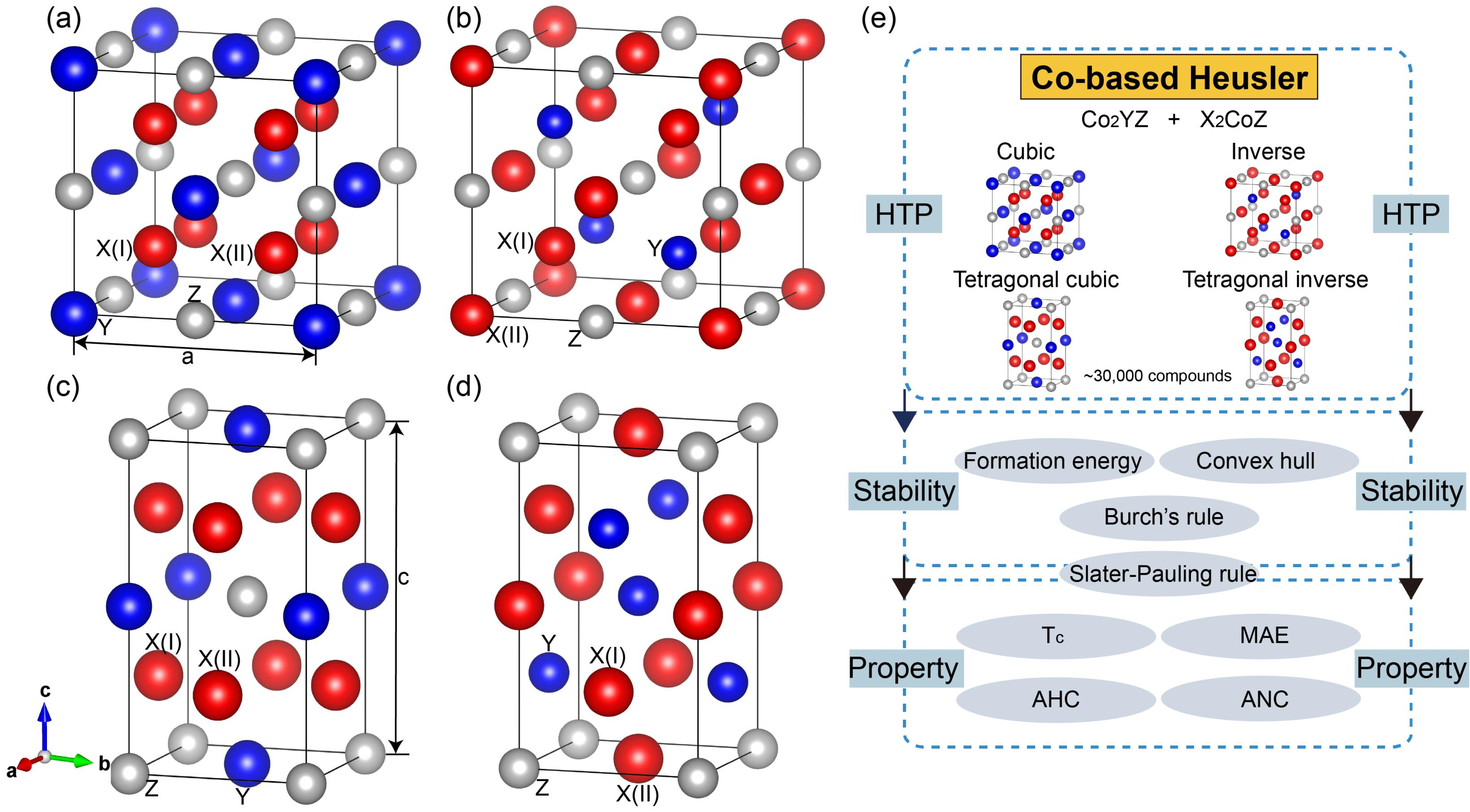Project
High-Throughput Design Co-based Heusler Alloys as Multi-Functional Magnetic Materials via Substitutional Doping
Heusler alloys are a remarkable class of intermetallic materials with a wide spectrum of intriguing physical properties promising for applications in energy harvesting/conversion, spintronics. As one of the typical Heusler alloy, Co-based Heusler alloy has several promising properties, e.g., high thermodynamic stability, high curie temperature (Tc), large magneto-crystalline anisotropy energy (MAE). Considering the abundant physical properties discovered in Co- based Heusler alloys, and that HTP calculations have already been successfully adopted to accelerate the discovery of new Heusler magnets. Nevertheless, there is a lack of systematic studies addressing the fundamental stability and intrinsic magnetic properties of Co-based Heusler alloys. Specifically, the investigation of the structural tetragonal distortion in Co-based Heusler alloys and its influence on the intrinsic magnetic properties is currently insufficient. In this proposal, our goal is to design multi-functional magnets in Co-based Heusler alloys (including Co2XY and X2CoY phases) via substitutional doping, based on high-throughput (HTP) density functional theory (DFT) calculations.
Project Details
Project term
January 1, 2023–December 31, 2023
Affiliations
TU Darmstadt
Institute
Theory of Magnetic Materials
Project Manager
Principal Investigator
Methods
The HTP calculations were carried out using an in-house developed HTP environment interfaced with the Vienna ab initio simulation package (VASP). The exchange-correlation functional was parameterized based on the generalized gradient approximation (GGA) in the flavor of Perdew-Burke-Ernzerhof (PBE). A two-step structural relaxation was employed to obtain the optimized atomic positions and lattice constants. Firstly, the HTP calculations were carried out among the 29,784 compounds based on the Co2YZ and X2CoZ prototypes. Secondly, the thermodynamic stability was evaluated in terms of the formation energy and the distance to the convex hull, where Burch’s rule was used to predict the cubic regular and cubic inverse crystal structures in terms of the electronegativity and the covalent radii difference of the corresponding elements. Subsequently, the compounds with finite spin polarization were selected, upon which the Slater-Pauling (SP) rule was applied to analyze the trends in magnetization. Finally, the magnetic properties of interest, including Tc and magneto-crystalline anisotropy energy (MAE), were calculated.
Results
According to the thermodynamic stability based on the HTP screening calculations, 223 predicted novel compounds and the experimentally validated compounds are systematically investigated and in Co-based Heusler alloys. The novel Co-based Heuslers predicted by our HTP work also include some all-d-metal compounds. In contrast to the conventional Heuslers with dominating d-d hybridization, the all-d-metal Heuslers consisting of mainly d-d hybridization cannot be properly interpreted by Burch’s rule. The Slater-Pauling rule, on the other hand, is found to well describe the relationship between the intrinsic magnetic properties, including the total spin moment and Curie temperature, and the number of valence electrons. Furthermore, the magneto-crystalline anisotropy is calculated for stable tetragonal compounds, providing useful information for the potential applications in the fields permanent magnets and magnetic recording materials.
Discussion
In summary, our HTP work provides an efficient workflow for designing Co-based Heulsers with intriguing intrinsic magnetic materials. By classifying the calculated results according to some existing physical rules, the SP rule, we gain a deeper physical understanding of the magnetic properties in connection with the electronic structure, which can be further utilized to guide experimental and computational exploration of the intrinsic magnetic properties of Heusler alloys.
Additional Project Information
DFG classification: 406 Materials Science
Software: VASP, SPR-KKR
Cluster: Lichtenberg
Publications
Hu, K; Xie, R; Shen, C; et al. High-Throughput Design of Co-Based Magnetic Heusler Compounds. Acta Materialia, 119255. (2023)
 Figure 1: (a) Cubic, (b) inverse, (c) tetragonal cubic, (d) tetragonal inverse structures and (e) workflow.
Figure 1: (a) Cubic, (b) inverse, (c) tetragonal cubic, (d) tetragonal inverse structures and (e) workflow.